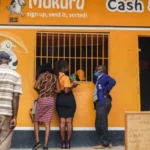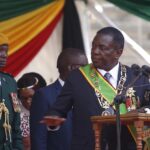BULAWAYO – Controversial businessman Wicknell Chivayo, a figure synonymous with allegations of corruption and shady dealings, enjoyed an unusually prominent role during President Emmerson Mnangagwa’s recent visit to Bulawayo for the Zimbabwe International Trade Fair (ZITF). Chivayo’s close proximity to the President, both at the trade fair and at State House events, has ignited a firestorm of criticism and raised serious questions about his influence within the highest echelons of power, particularly at a time when his source of wealth is under intense scrutiny.
Eyewitness accounts and photographic evidence from the ZITF paint a picture of Chivayo as more than just a mere attendee. He was seen closely following President Mnangagwa and visiting Mozambican President Daniel Chapo as they toured the various exhibition stands on Friday, often overshadowing government ministers and other high-ranking officials in the presidential entourage.
The previous day, Chivayo was spotted in equally conspicuous circumstances, sitting with President Mnangagwa’s sons at a State House banquet hosted in honour of President Chapo. This seemingly privileged access to the President and his family has fueled speculation about the nature of their relationship and the extent of Chivayo’s influence within the ruling circles.
Chivayo’s prominence at the ZITF comes against a backdrop of serious allegations of corruption and financial impropriety. South Africa’s Financial Intelligence Centre (FIC) recently exposed a scandal in which over US$40 million of Zimbabwean taxpayer funds, earmarked for critical election materials, allegedly flowed directly into Chivayo’s accounts.
A staggering R800 million of this amount was allegedly subsequently transferred to accounts belonging to companies owned by Chivayo, including Intratrek Holdings and Dolintel Trading Enterprise. These revelations have raised serious questions about the integrity of the procurement processes and the potential misuse of public funds.
Despite the gravity of these allegations, the Zimbabwe Anti-Corruption Commission (ZACC), which last year claimed it was ready to charge Chivayo over the ZEC case, has remained conspicuously silent, even in the wake of the damning revelations emanating from South Africa. This inaction has further fueled public suspicion and raised concerns about the effectiveness and independence of ZACC in tackling high-level corruption.
Adding to the intrigue, President Mnangagwa himself attempted to distance himself from Chivayo during a meeting with editors at State House in February. He described Chivayo as a philanthropist and challenged anyone who believed that Chivayo had stolen their wealth to file a police report. However, Chivayo’s recent prominence at the ZITF appears to contradict these earlier attempts at disassociation, further muddying the waters and raising questions about the true nature of their relationship.
The public display of closeness between President Mnangagwa and Chivayo has drawn sharp criticism from various quarters, with political analysts and commentators expressing concern about the implications for the President’s credibility and the government’s commitment to fighting corruption.
Former Zanu-PF member Reason Wafawarova argued that Chivayo’s prominence at the ZITF, where he overshadowed government ministers, reflected badly on the Office of the President. He claimed that government protocol had been sidelined by a “shadowy, parallel structure” – often referred to as the “Farm Cabinet” – which now controls access to the President.
“Wicknell Chivayo’s prominence — overshadowing vice presidents and Cabinet ministers at official events — is symptomatic of this capture,” Wafawarova said. He further highlighted Chivayo’s “tainted record,” describing him as “a convicted fraudster who served two years in prison, an individual exposed for looting R800 million through the corrupt ZEC procurement scandal for the 2023 elections, and for receiving millions of dollars in Treasury payments for undelivered goods and services.”
Former opposition Nkayi South Member of Parliament (MP), Abednico Bhebhe, echoed these concerns, stating that Chivayo’s proximity to a visiting head of state at the ZITF may indicate his perceived influence or standing with President Mnangagwa.
“Given Chivayo’s involvement in corruption scandals, this public display of association may imply Mnangagwa’s continued support or tolerance for Chivayo’s activities, potential influence or favours being exchanged and possible shared interests or business dealings,” Bhebhe said. He warned that these developments could have serious implications for President Mnangagwa’s administration, particularly regarding perceptions of corruption and accountability.
“Under normal circumstances, investigations into these allegations would be necessary to determine the extent of Mnangagwa’s involvement or knowledge of Chivayo’s corrupt dealings,” Bhebhe added. He argued that “Zimbabwe’s progress is hindered by systemic corruption, and Chivayo’s involvement in both the late Robert Mugabe and Mnangagwa’s administrations raises concerns about entrenched corruption.”
Bhebhe concluded that “without change of government coupled with meaningful reforms, corruption may persist, hindering development and economic growth of Zimbabwe.”
Prominent political analyst Rejoice Ngwenya was equally critical, arguing that the ZITF events had significantly dented President Mnangagwa’s credibility. “Actually, it’s not about Chivayo,” Ngwenya said. “Our reputation and integrity is usually measured against those with whom we associate. The most sensible thing Mnangagwa could do is to disentangle himself from these crony capitalists until their legitimacy is confirmed.”
Zapu Bulawayo secretary Vivian Siziba expressed disbelief that Chivayo had never been arrested, given the numerous corruption scandals linked to him. “This is baffling to say the least,” Siziba said. “Chivayo has been fingered in many shady deals, which haemorrhage the national purse. On the contrary, he is a free man and rubbing shoulders with the country’s No.1 Citizen to an extent of being part of the president’s entourage that engages foreign dignitaries during his state duties.”
Siziba further questioned whether the President himself was protecting Chivayo, stating: “In the light of the president’s awkward relationship with Chivayo, could people be wrong or persecuted for concluding that the main handler and protector is the president himself?”
Harare-based political commentator Reuben Mbofana described the situation as “worrying,” highlighting the incongruity of someone accused of massive corruption being seen in close proximity to the President.
“What we witnessed at the ZITF — with Wicknell Chivayo not only attending a state banquet but also visibly accompanying President Mnangagwa and President Chapo of Mozambique during the exhibition tour — speaks volumes,” Mbofana said. “It completely contradicts previous denials by President Mnangagwa of having any association with Chivayo. This public display strongly suggests not only familiarity but a close and privileged relationship. It is especially concerning that someone implicated in serious corruption scandals would be given such prominence at high-level state functions.”
Mbofana argued that this undermines all efforts at promoting transparency, accountability, and good governance in Zimbabwe. “The optics are damaging: they erode public trust in the presidency and send the wrong message — that proximity to power can shield individuals from scrutiny and consequences,” he said.
He also raised “legitimate questions as to whether the government is genuinely committed to fighting corruption or is instead actively enabling it.” Mbofana concluded with a stark warning: “Zimbabweans deserve leaders who are beyond reproach — not ones entangled with individuals facing credible allegations of massive looting and abuse of public resources.”

Follow @MyZimbabweNews











